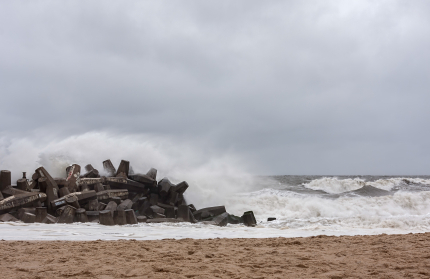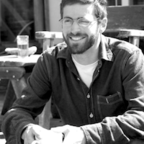The recent anniversary of Hurricane Sandy renewed discussions about climate change. How can Judaism help me connect with hope, given the frightening prospect of a world where events like Sandy are the “new normal”?

When it comes to climate change, it is easy to feel hopeless. Author Bill McKibben summarizes our situation with three very important numbers: The first is two degrees Celsius. Just about the only thing the nations of the world have agreed on about climate change is that two degrees is the maximum global temperature increase that we can reach before triggering a catastrophic tipping point.
The second number is 565 gigatons. Scientists estimate that CO2 output beyond this number will equal a two-degree rise. Without drastic measures we will reach that limit in about 16 years.
The third and most frightening number is 2,795 gigatons. This is the amount of carbon already contained in the reserves of the fossil fuel companies; five times the amount that would bring us to the point of no return is already planned to be burned.
What is this disastrous, almost-certain fate we speak of?
Two degrees Celsius means more frequent and fiercer storms, more extreme temperatures, uncontrollable wildfires, severe droughts and the destruction of crops. The continued rapid acidification of the oceans. Sea levels that rise between two and six-and-a-half feet this century, and the ensuing displacement of tens of millions of people. All of this is already well underway.
How can we possibly be hopeful in the face of all of this?
Rabbi Shai Held says that the greatest heresy in Judaism is to say that the world is as it must be. In other words, it is against the deepest grain of Judaism to give up on our ability to reshape the world. Rebbe Nachman of Bratslav put it another way: “If you believe you can destroy, believe you can fix.” We have real power, individually and communally, to shape our world.
When it comes to problems as vast and diffuse as climate change, it is easy to feel overwhelmed. Some people respond by denying its reality, while others accept its reality but feel paralyzed. The third category is those who act, whether in ways large or small.
We have learned that when people have traumatic experiences, those who actively respond in the moment end up suffering less from post-traumatic stress disorder. This is also applicable in the spiritual realm. In the face of terrifying situations, we will be more hopeful if we empower ourselves by responding.
Start small. Just do something. Educate yourself and others about climate change. McKibben’s organization 350.org is a good place to start. Learn not only about the dire situation but also about the thousands of people and organizations doing something about it. Get involved. Consider making your life carbon-neutral through reducing your carbon footprint and carbon offsetting (such as through the Nature Conservancy). Try out the radical spiritual act of unplugging for Shabbat. Reconnect with the natural world and your family and community without your cell phone for a day, without hearing the overwhelming newscasts.
If you believe you can destroy, believe you can fix. If you believe you can lose hope, believe you can regain it.

Take action on climate change through 350.org.
Check out The Sova Project, sponsored by Hebrew College, which focuses on economic and environmental sustainability. They have partnered with the Heschel Sustainability Center, among other organizations, on this new project.
The Coalition of Environmental Jewish Life (COEJL) and Shalom Center also offer resources, reflection and opportunities to join the movement to solve the climate crisis.
This post has been contributed by a third party. The opinions, facts and any media content are presented solely by the author, and JewishBoston assumes no responsibility for them. Want to add your voice to the conversation? Publish your own post here. MORE
